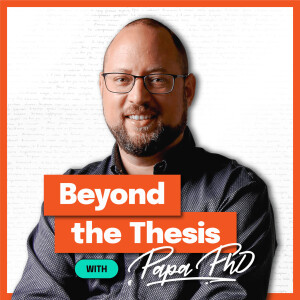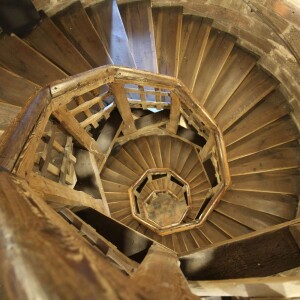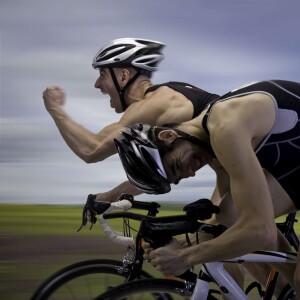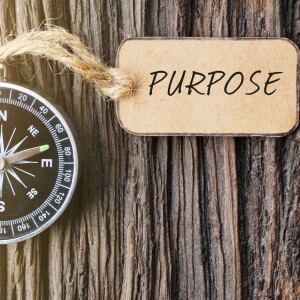Episodes

Thursday Jan 02, 2020
Thursday Jan 02, 2020
We're fresh into a new year, and this time of year is one of re-evaluation, decision-taking, and renewal for a lot of you out there. This week, you'll hear Inês Thomas Almeida's recount of 20 years starting in a biology bachelor's and leading to a PhD project in musicology, with many twists and turns in between. Inês brings a story of self-questioning, of determination, of resilience, of dealing with mental health issues, and of reinvention.
Inês Thomas Almeida was born in the Dominican Republic and grew up in Portugal. After studying biolgy and Piano in Lisbon she entered the University of Évora to study singing, where she awarded "Best Student of the University" in two consecutive years. She then moved to Germany and studied voice with Klaus Häger at the Rostock University of Music and Theater, having graduated there in 2007. As a member of the Opera Studio she performed several roles, such as the main role in Orfeo ed Euridice from Christoph Willibald Gluck and Zia Principessa in Suor Angelica from Giacomo Puccini. In 2008 she was prizewinner of the International Singing Contest Kammeroper Schloss Rheinsberg. As a prizewinner she sang in many productions at the Schloss Rheinsberg Opera. In 2011, in Berlin, Inês founded Berlinda, an NGO raising the awareness of the culture of Portuguese-speaking countries and bringing social support to the Portuguese community in Berlin. She is currently working towards a PhD in musicology at FCSH, Universidade Nova de Lisboa.
Join the Papa PhD Postgraduate Career Exploration Group!
What you’ll learn about in this episode:
How there is always place for reassessing and reorienting, at any stage of your life, irrespective of what people around you may say or think
The importance of knowing when to drop an ongoing project to level up to the next, better one
How finding mentors at different stages of your life can help you in this "leveling up" process
Why listening to your body is important in staying healthy and also in taking important life decisions
Why you should allow yourself to take opportunities, even when they arrive unannounced
Why you should always prioritize any mental health challenges that may arise along your path
This episode’s pearls of wisdom:
“I am very glad that my life turned in all these ways and in all these confusing curves and roundabouts, because now I have this maturity, which turns out is very good for me, for my PhD, and for academia. I think I would not see things the way I do if I was 20 years younger.”
“In these 20 years between going to biology for the first time and writing the PhD, now, I did such an amount of different things and all this work, with the kids, all these are life experiences which I can use for my PhD. And I do use them.”
“Age enriches you, so use your age and use all your experiences in order to follow this thing you wanted. And never think you're too old or that you should, by now, know exactly what to do and know your path. This is not true – your path comes in whichever way it has to come and you will follow it in whichever way yoou are going to see and whichever way is best for you.”
“Get professional help. If you have a mental issue, this is someting that most people see as a bad thing, or it shows that you have problems, and you're a complicated person. It's not at all. If you have a mental health issue, you're like the most normal people in the world, because almost everyone, in some point of their life, is going to have a mental issue. So it's like going to the dentist or going to the orthopedist when you have a problem in your foot.”
Leave a review on Podchaser !
Support the show on Patreon !
You might also like the following episodes:
Inês Campos Costa – Career advisory: PapaPhD.com/41
Joe Makkerh – Entrepreneurship: PapaPhD.com/2
Joana Lobo Antunes – Science Communication: PapaPhD.com/25
Susanna L Harris – Science Communication: PapaPhD.com/42
Launching your podcast?

Thursday Dec 26, 2019
Thursday Dec 26, 2019
For the last episode of the 2019 season of Papa PhD, instead of an interview, we're bringing you some of the best advice our guests have shared so far, so enjoy the insights, take the opportunity to go listen to the earlier episodes, and remember to rate and leave a comment on your podcast app, and to share any episodes that resonate with you with your friends!
Happy listening and happy sharing!
Join the Papa PhD Postgraduate Career Exploration Group!
Leave a review on Podchaser !
Support the show on Patreon !
You might also like the following episodes:
David (Viva Frei) Freiheit – Youtube content creator: PapaPhD.com/15
Tamarah Luk – Entertainment Law: PapaPhD.com/10
Kirsten Sanford – Science communication: PapaPhD.com/13
Inês Thomas Almeida – Musicology: PapaPhD.com/27
Launching your podcast?
If you're preparing to launch your podcast, you may be asking yourself what hosting platform to use.
I launched Papa PhD on Bluebrry because I wanted a professional service that would interface with my WordPress website, that would robustly broadcast Papa PhD to all platforms, and that would allow me to grow my podcast in years to come.
And these are the reasons why I'm recommending the Blubrry podcast hosting and syndication platform.
Click on the button below or use the promo code PapaPhDBlue on the Blubrry website to unlock a one month free trial:
Try one free month with Blubrry !
If you are starting a serious podcast project, do consider one of the first podcasting hosts out there, offering state of the art services, including IAB certified statistics, based on years of experience in the podcasting space.
Happy podcasting!

Thursday Dec 19, 2019
Thursday Dec 19, 2019
Life isn't a straight line. In particular, professional life is not as much of a straight line as it was in the past. As scientists, as researchers, the path we follow is determined by our choices, but also by our collaborations and by opportunities that arise along the way. In this episode, Joana Lobo Antunes will share with us the interesting path that brought her from pharmacy and organic chemistry to a full-time career in science communication.
Joana Lobo Antunes is Head of Communications at Instituto Superior Técnico, lecturer in Science Communication and Social Media for Scientists, FCSH NOVA and Universidade Nova de Lisboa Doctoral School, coordinator of science radio show 90 Segundos de Ciência, and founder and current president of the Portuguese Science Communicators Network SciComPT. Joana has previous experience as a researcher (PhD in Organic Chemistry) and as a university professor, having transitioned to a position as a professional science communicator at ITQB, Universidade Nova de Lisboa, in 2012. Her main interests are the use of theatre improvisation techniques and storytelling in science communication. Joana has also been engaging scientists to use social media tools to connect and interact with peers and lay persons, improving science visibility and the public image of scientists.
Join the Papa PhD Postgraduate Career Exploration Group!
What you’ll learn about in this episode:
The positive impact an international experience can have on you scientifically, but also personally
Why you shouldn't be weary of reaching out to potential mentors or employers looking for insight or collaboration opportunities
How interdisciplinary work can cross-pollinate science and bring on new fields of study and of creation
How talking about your research to a lay public can make you a better scientist and a better job candidate
The importance of collaborations and team work to innovation and professional growth
This episode’s pearls of wisdom:
“There's so much more to science than the papers and the awards - that's not the scientific process.”
“What I learned from my supervisor and from the scientists was that you can't live being a hurricane because you'll need to constantly be moving. She taught me to anchor my ideas into the real world, because I can't keep spinning all the time - I need to be grounded and I need to build stuff.”
“Getting a PhD is not about the science that you learn - it's about the process. It's about what you learn about yourself, it's about learning how to get answers, it's to learn how to deal with a team, how to deal with a PI, how to deal with buying stuff, how to deal with the negative results. So, doing a PhD is so much more than just about the science that you do. It's about everything else that you gain by doing a PhD.”
“So, having a PhD is not just the title on your thesis - having a PhD is so much more than that. It's the skills that you acquire.”
“Women are less open to give their time to do activities other than their work. I believe it has to do with the fact that women are usually more overwhelmed than men, with a lot of tasks. This has a repercussion, which means that for girls who would like to come to science, the role models are mostly men - the ones that are interviewed, the ones that come on the television, the ones that come on the newspapers are men. And we need to address this, we need to have more women as protagonists, on the media and everywhere else, because it's important to get women doing all kinds of jobs.”
Joana's links: Instituto Superior Técnico; 90 Segundos de Ciência; SciComPTe
Leave a review on Podchaser !
Support the show on Patreon !
You might also like the following episodes:
Inês Campos Costa – Career advisory: PapaPhD.com/41
Kelly Bullock – Scientific illustration: PapaPhD.com/9
Kirsten Sanford – Science Communication: PapaPhD.com/13
Patrícia Monteiro – Science outreach: PapaPhD.com/24
Launching your podcast?

Thursday Dec 12, 2019
Thursday Dec 12, 2019
This episode is a special one – it was recorded live with three guests who were speakers at the 2019 edition of BEBday, a meeting organized by the students of my PhD program at the University of Coimbra, Portugal – the BEB PhD Program. This year's edition brought a group of scientists who had a diverse set of experiences carving their career path and shared great insights with the grad students. Around the table, for this interview, you'll hear Fábio Fiúza Rosa, a PhD student/entrepreneur, Gil Costa, a scientific designer, and Patrícia Monteiro, a researcher with a passion for knowledge transfer and science outreach.
Fábio Fiúza Rosa is graduated in Biology and holds a MSc in Biochemistry, both by University of Coimbra. He is currently a PhD student at Center for Neurosciences and Cell Biology (CNC) from University of Coimbra (PDBEB) and at the Faculty of Medicine of Lund University. He holds 3 patents and is Co-founder of two start-ups: BRT Blood Reprogramming Technologies, Lda (Coimbra, Portugal) and Asgard Therapeutics AB (Lund, Sweden). Fábio Fiúza Rosa participated in multiple accelerator programs, being awarded with Arrisca C (University of Coimbra, 2016), Entrepreneurship competition Montepio Acredita Portugal (Health Prize 2017). Recently, he was awarded with the Jury’s Best Pitch Award promoted by EIT Health (Oxford University, UK. August 2019).
Gil Costa obtained a degree in Biology (University of Coimbra) and a PhD in Neurosciences (PDBEB, University of Coimbra), integrated in Doctor Zachary F. Mainen’s laboratory at Champalimaud Foundation also in collaboration with Instituto Gulbenkian de Ciência (IGC), Lisboa. Since completing his PhD, Gil Costa has been working as Scientific Illustrator at Champalimaud Research and Gulbenkian Foundation. More recently, he established as a freelancer and here you can consult some of his works: Gil Costa | Science Design.
Patrícia Monteiro has a degree in Pharmaceutical Sciences, University of Coimbra and PhD degree in Neurosciences (PDBEB, University of Coimbra), where she worked at Doctor Guoping Feng’s laboratory at the Massachusetts Institute of Technology (MIT, USA). She was awarded with an EMBO fellowship and also a Branco Weiss fellowship to study how stress impacts brain networks. Currently, Patricia is a researcher at the Neuroscience Research Domain, ICVS/School of Medicine, University of Minho.
Join the Papa PhD Postgraduate Career Exploration Group!
What you’ll learn about in this episode:
As part of a research team, you can take part in translational projects developed in your lab
Getting to your dream job is an incremental process with different stepping stones along the way, where you gain experience and skills
The important role collaboration plays in scientific research and innovation
Why you should say yes to opportunities that arise that may be outside your comfort zone
Making use of structures supporting innovation and knowledge translation offered by your university, if you have an research-related business idea
How universities have grown to foster researchers developing outreach initiatives
How as a woman in the STEM space you can be a role model for girls and young women
This episode's pearls of wisdom:
"If you're interested in entrepreneurship and really have an opportunity to translate it or, at some point, to understand the path that you have to take to translate the idea to the clinics, grab it as hard as you can and, no matter what, work for it."
"Make sure that any idea you're generating in the early stage, you really understand it, you really know your competitors, you really know your market. And make sure you will have a place whatever what market or field you're aiming for."
"Whatever you do, do it with passion. Be the best of yourself in every hat you wear. If you're a father, be the best father you can be. If you're a scientist, be the best scientist you can be. If you're a podcaster,

Thursday Dec 05, 2019
Thursday Dec 05, 2019
What makes some people impervious to adversity? What kind of super-power do they have that allows them to get up after a major hit and find the will power to lick their wounds and come out fighting? This week, hear Mark Crandall tell his story of beating the odds and show us how we all have this power of resilience within us.
Mark Crandall is a Licensed Master’s in Social Work and a Licenced Chemical Dependency Counselor. He is also a keynote speaker, a Clinical Interventionist, Author of Embrace Your Past -Win Your Future, and the host of the Purpose Chasers podcast. Mark went from being a lost boy with countless traumatic experiences, drug addiction, prison, and an undying self-hatred to building multiple 6 figure coaching practices, and being a highly sought after Clinical interventionist.
Join the Papa PhD Postgraduate Career Exploration Group!
What you’ll learn about in this episode:
How limiting beliefs may be preventing you to perform at your best
Why it is important that your academic and your career choices be based on your deeply seated personal core values and interests
How a mentor can push you towards reaching your goals, be they academic or entrepreneurial
This episode’s pearls of wisdom:
“It doesn’t matter where you come from. It doesn’t matter who you are as a person or what you think other people will think of you. If you don’t take action to do the things you’ve been called to do, you’re never going to do the things that you’ve been called to do. My experience is – if you’re resilient, you can do anything that you want to do.”
“Why are you doing what you’re doing? You can’t hit a target that you can’t see. And if you’re shooting at targets that you can’t see, you’re going to be hitting all kinds of other people’s targets, right? You’re going to hit what other people are shooting for. When you get really, really clear and intentional on why you’re doing what you’re doing, it just becomes so cool – you get to be a part of the journey.”
“Most people take action or don’t take action based off what they think other people are going to think about them. People are not thinking about you – they’re thinking about themselves. And they’re thinking about what you’re going to do and how that’s going to make them look. So, when you really start to focus on why you’re doing what you’re doing, and what you want to do in life, and you stop thinking about what other people are thinking –which is themselves – you can get really intentional about what you want to do and you can live a life of purpose.”
Mark’s links: LinkedIn – Linkedin.com/in/mark-crandall-lmsw-lcdc-570b1280; Purpose Chasers podcast – Markcrandall.net/purpose-chasers-podcast; Facebook – Facebook.com/purposechaserspodcast; Twitter –Twitter.com/purpose_chasers.
Leave a review on Podchaser !
Support the show on Patreon !
You might also like the following episodes:
Clarissa Wright – Publishing: PapaPhD.com/34
Fiona Robinson – Patient education: PapaPhD.com/6
Liliana Vitorino – Industry: PapaPhD.com/31
Tamarah Luk – Entertainment Law: PapaPhD.com/10
Launching your podcast?
If you're preparing to launch your podcast, you may be asking yourself what hosting platform to use.
I launched Papa PhD on Bluebrry because I wanted a professional service that would interface with my WordPress website, that would robustly broadcast Papa PhD to all platforms, and that would allow me to grow my podcast in years to come.
And these are the reasons why I'm recommending the Blubrry podcast hosting and syndication platform.
Click on the button below or use the promo code PapaPhDBlue on the Blubrry website to unlock a one month free trial:
Try one free month with Blubrry !
If you are starting a serious podcast project, do consider one of the first podcasting hosts out there, offering state of the art services, including IAB certified statistics, based on years of experience in the podcasting space.
Happy podcasting!

Thursday Nov 28, 2019
Thursday Nov 28, 2019
In your life as a student or as a researcher, you may hear discouraging voices telling you you’re not good enough, not intelligent enough, or even not man enough for the task or project at hand. In today’s episode, we’re talking with Cindy Hovington, founder of CuriousNeuron.com, about why it is important to distance yourself from these opinions, to listen to your own inner voice and your own will, but also to take in account input coming from people who have more than a unidimensional impression of your personality and your abilities.
Cindy did her Ph.D. in neuroscience at McGill University, in Montreal, where she focused on the cognitive and emotional difficulties experienced in people with psychosis. She volunteered with a program called BrainReach at McGill and this how she came to love knowledge translation. She then decided to pursue a postdoc in education and studied the impact of knowledge translation in the community. In parallel, she launched her company – Curious Neuron – a resource for parents and caregivers that provides science-backed info about child development and education where she has been able to merge both of her fields of study.
Join the Papa PhD Postgraduate Career Exploration Group!
What you’ll learn about in this episode:
How teaching and popularizing science to a lay audience can help you get a better grasp and tell a better story of your research subject
How a PhD or a postdoc allows you to develop the skills you need for your life projects, even if they fall outside of the academic realm
The important role volunteering can play opening different professional vistas for you during grad school
Transferrable skills you develop during a PhD
The part perseverance and resilience play in obtaining a doctoral degree and the reality of a multifaceted intelligence
Why it is crucial to encourage girls to go into STEM domains, if that’s where their interests lay
This episode’s pearls of wisdom:
“As grad students, we have a lot of presentations, but they are presentations that we give to other grad students, and researchers. But it was so different to be in the classroom and communicate what a neuron is to a child who is in grade 3. So when I was doing that as a volunteer, that's when it hits you: if I don't know what I'm talking about, if I don't know what a neuron is or how it communicates with other neurons, I can't talk about it to an 8 year-old or a 9 year-old. So, if you can explain something to a 9 year-old, you really understand what you're doing.”
“Don’t be afraid to merge different fields.”
“After finishing, I really changed in terms of my internal talk, you know – that negative internal self-talk became 'I can do anything I want'. Anything you want is at your grasp – you could just get it as long as you work for it.”
Cindy’s links: LinkedIn – Linkedin.com/in/cindyhovington; Twitter – Twitter.com/curious_neuron; Instagram – Instagram.com/curious_neuron; Facebook – Facebook.com/curiousneuron; Website – CuriousNeuron.com; Podcast – Anchor.fm/cindy632
Leave a review on Podchaser !
Support the show on Patreon !
You might also like the following episodes:
Fiona Robinson – Patient education: PapaPhD.com/6
James Bowers – Communication consulting: PapaPhD.com/39
Kelly Bullock – Science illustration: PapaPhD.com/9
Kirsten Sanford – Science communication: PapaPhD.com/13
Launching your podcast?
If you're preparing to launch your podcast, you may be asking yourself what hosting platform to use.
I launched Papa PhD on Bluebrry because I wanted a professional service that would interface with my WordPress website, that would robustly broadcast Papa PhD to all platforms, and that would allow me to grow my podcast in years to come.
And these are the reasons why I'm recommending the Blubrry podcast hosting and syndication platform.
Click on the button below or use the promo code PapaPhDBlue on the Blubrry website to unlock a one month free trial:

Thursday Nov 21, 2019
Thursday Nov 21, 2019
How easy is it to be a female scientist? How easy is it to be a female founder and CEO? How easy is it to find work/life balance when you wear both of these hats and are building a family, too? In this episode, you will be hearing from Margaret Magdesian, founder and CEO of Ananda Devices, about her academic path, about how she transitioned to the biotech startup space, and about her answers to these important questions.
Margaret Magdesian is a scientist-entrepreneur with over 15 years of experience in biopharmaceutical research. In collaboration with researchers from McGill University, she has developed a great technology to rapidly grow human nervous-system-on-a-chip. Seeing the potential of this technology to accelerate drug development, in 2015 she raised funds with investors and launched the company Ananda Devices. The company has since won over 25 grants and awards in science and innovation including the 2016 Top 10 Quebec Discovery of the Year, the 2018 Top 7 SheEO in Canada, 2018 Canadian Export Challenge and 2019 Cartier Women’s Initiative Awards.
Join the Papa PhD Postgraduate Career Exploration Group!
What you’ll learn about in this episode:
The differences between research in academia and in the startup context
The importance of understanding your risks when embarking on a project, be it academic or entrepreneurial
How university-based awards and programs can boost you in your startup project stemming from academic research
The culture differences between academia and industry
The value and social impact women can bring to the entrepreneurial arena
The importance of being able to articulate your research in lay terms and adapt your communications to each different audience
This episode’s pearls of wisdom:
“When we finish a PhD, we know how to get information. When someone talks to you about a new genetic approach, you know how to go to PubMed and go deep down. So what we really learn from a PhD is how to get information. I’m very disciplined – I looked for books about financial budgets, scaling up, how to hire people, I read one about introverts and leadership, so several books that really relate to me.”
“What drives me every morning to go to work is the big goal, a sense of mission – why am I doing this? Sometimes it seems overwhelming because there’s so much to do… But it’s ok, I have a mission. Just grab some paper and step by step – what I ‘m going to do first, second, third. And this is how you organize things and then move along, you know? And it’s so nice everyday that you tick a box. You see the mission coming, and it’s so much more exciting than depressing.”
Margaret’s links: LinkedIn – Linkedin.com/in/margaret-magdesian-89954036; Website – Anandadevices.com; SheEO – SheEO.world; TEDx talk – Youtu.be/xNYq6PwMV0U; McGill Dobson Cup – McGill.ca/dobson/entrepreneurship-programs/mcgill-dobson-cup
Leave a review on Podchaser !
Support the show on Patreon !
You might also like the following episodes:
Chris Kent – Biotech Startup CEO: PapaPhD.com/11
James Bowers – Communication consulting: PapaPhD.com/39
Kirsten Sanford – Science communication: PapaPhD.com/13
Margaret Magdesian – Biotech Startup CEO: PapaPhD.com/21
Launching your podcast?
If you're preparing to launch your podcast, you may be asking yourself what hosting platform to use.
I launched Papa PhD on Bluebrry because I wanted a professional service that would interface with my WordPress website, that would robustly broadcast Papa PhD to all platforms, and that would allow me to grow my podcast in years to come.
And these are the reasons why I'm recommending the Blubrry podcast hosting and syndication platform.
Click on the button below or use the promo code PapaPhDBlue on the Blubrry website to unlock a one month free trial:
Try one free month with Blubrry !
If you are starting a serious podcast project, do consider one of the first podcasting hosts out there, offering state of the art services,

Thursday Nov 14, 2019
Thursday Nov 14, 2019
What happens when you have all your ducks lined up and the universe throws you a curveball? That’s the moment when you have to regroup, reflect deeply on what you want the new path that is opening up to you to look like and trace a game plan that will allow you to come out winning. Drew Slack was well on his way towards a life in the professoriate when his curveball arrived. In today’s episode, we’ll learn about the principles, the resources and the values that were key in building the career he has carved out for himself today.
Drew Slack is an experienced Medical Affairs Director with accomplished career history in the biotechnology and health regulatory sectors. Skilled in Oncology, Molecular Biology, Biotechnology, Management, and Clinical Research. Scientific professional with Postdoctoral experience in Translational & Clinical Oncology Research, with Ph.D. focused in Molecular Pharmacology and Oncology from McGill University.
Join the Papa PhD Postgraduate Career Exploration Group!
What you’ll learn about in this episode:
Everyone is subject to sudden changes coming from external factors, such as the abrupt cancellation of a grant program
The importance of physical activity and community outside your research as a graduate student and as a postdoc
The regulatory domain as a career outlet for PhDs in the life sciences
How to rebrand yourself when interviewing for a non-academic position
How informational interviews can help you navigate the hiring process for jobs in governmental organizations
Moving laterally inside an organization to reach a position that fits you best
How your hobby or your side-gig can shape your professional future and have a tangible impact on your career opportunities
The importance of committing a portion of your time to you and your own personal and professional development
This episode’s pearls of wisdom:
“That confidence going in is so important, right? If you don’t possess that, you’re not going to be fluid, you’re not going to smile, you’re not going to present yourself in a way that is natural and authentic. So, I think this is important to secure the position. You have to present yourself professionally well, but you have to present yourself well personally, as well. And I think all of those things are tied together by having that confidence that you know the organization’s mission and values, you’ve read every document that is publicly available, you’ve really taken every step to educate yourself about the position… If you haven’t done that, if you haven’t completed your due diligence in that regard, then you’re not ready.”
“Postdoctoral work is the most physically and emotionally challenging environment, I think. I think that’s where people find themselves most explicitly tested. It’s a real walk of faith to do that. So, I say that’s one thing – is that you really learn to trust and rely on yourself and without question, that’s where you develop your strongest work ethic and determination.”
“That capacity to calculate and to actually take risks is a skill tat every good academic researcher develops almost to the point of intuition. And I do think that that’s amongst many of the skills that you develop in a research setting – that self-reliance, that confidence that you inevitably have to develop in your own hypothesis, in the quality of your own work. You’re really the captain of your own ship and I don’t think we give ourselves enough credit for it. When you go into professional environments, you see that you, in some of those regards – autonomy, self-sufficiency, professional engagement – all of these things, I think, help PhDs stand above their competitors.”
Drew’s links: www.Exactis.ca; LinkedIn: LinkedIn.com/in/drew-slack-a89974111/
Leave a review on Podchaser !
Support the show on Patreon !
You might also like the following episodes:
Chris Kent – Biotech Startup CEO: PapaPhD.com/11
Sathy Rajasekharan – Global Health: PapaPhD.com/16

Thursday Nov 07, 2019
Thursday Nov 07, 2019
Can life be made exclusively of successes? Can you find fulfillment in a job that pays well but is not aligned with your values? Does every postdoc get to be a professor? In this episode of Papa PhD, we address all these important questions and much more, as we talk with Abel Polese about his academic career, about all the other things he has going on and about how he glues everything together to achieve balance.
Abel Polese is a researcher, trainer, writer, manager and fundraiser dealing with development and capacity building in Europe and Asia. He is also interested in Science Excellence, Open Science and alternatives indicators to measure science performance and is the author of “The SCOPUS Diaries and the (il)logics of Academic Survival: A Short Guide to Design Your Own Strategy and Survive Bibliometrics, Conferences, and Unreal Expectations in Academia”, a reflection on academic life, research careers and the choices and obstacles young scholars face at the beginning of their career.
Join the Papa PhD Postgraduate Career Exploration Group!
What you’ll learn about in this episode:
How to build a career based on diversification, with a part-time academic position
The day-to-day in the domain of area studies in social sciences
Dealing with anxiety in academia and in life
Why it may be worth it to trade a secure career for a fulfilling one
The importance of giving priority to your mental health when you need to, to allow you to bounce back and pick up where you left off
This episode’s pearls of wisdom:
“Don’t kind of postpone what you want to do simply because you think ‘Ah… I’m going to get tenure and then I’m going to have fun’. If you don’t learn to have fun every single day of your life, you’ll just forget about it. And then, your going to moan the rest of your life.”
“It’s good to be stressed – it brings adrenalin and then it brings you desire to go further. But don’t overstress and think that your life will be over if you don’t get professorship, because this is absolutely not true. And all the greatest successes, they start with a failure or several failures. I mean, success is the by-product of failure.”
“Not getting one thing is just… let yourself open to other things.”
“Train yourself to live in uncertainty because there is nothing certain, even if you have tenure track. I mean, your head of department might change, or you might hate them so much that you want to change jobs. Or if you are in the business sector, your company might go bankrupt at any time.”
Abel's links: Twitter – @Abiquitous and @Scopusdiaries; LinkedIn – Linkedin.com/in/abel-polese-4b2470130/; Blog post on the SCOPUS diaries – ThesisWhisperer.com/2019/09/11/fail-again-fail-better-and-then-write-a-book-about-it/; The 7-year postdoc – Blogs.ScientificAmerican.com/guest-blog/the-awesomest-7-year-postdoc-or-how-i-learned-to-stop-worrying-and-love-the-tenure-track-faculty-life/
Leave a review on Podchaser !
Support the show on Patreon !
You might also like the following episodes:
David (Viva Frei) Freiheit – Youtube content creator: PapaPhD.com/15
Tamarah Luk – Entertainment Law: PapaPhD.com/10
Kirsten Sanford – Science communication: PapaPhD.com/13
Inês Thomas Almeida – Musicology: PapaPhD.com/27
Launching your podcast?
If you're preparing to launch your podcast, you may be asking yourself what hosting platform to use.
I launched Papa PhD on Bluebrry because I wanted a professional service that would interface with my WordPress website, that would robustly broadcast Papa PhD to all platforms, and that would allow me to grow my podcast in years to come.
And these are the reasons why I'm recommending the Blubrry podcast hosting and syndication platform.
Click on the button below or use the promo code PapaPhDBlue on the Blubrry website to unlock a one month free trial:
Try one free month with Blubrry !
If you are starting a serious podcast project, do consider one of the first podcasting hosts out there,

Thursday Oct 31, 2019
Thursday Oct 31, 2019
In today’s life, your ability to pivot and to embrace new projects is key. You are actually expected to change employment on a 3 to 5-year cycle in the current job market. These pivots can happen between academic positions, between academia and industry, and between non-academic jobs. This week, we’ll be hearing from Simon Moore, whose stellar academic career has led him into a successful and fulfilling position in the pharmaceutical industry, where the scientific acumen he accrued throughout his academic carreer is put to use and challenged to its full extent.
During both graduate studies at McGill University (Montreal, Canada) and postdoctoral studies at Columbia University (NYC), Simon examined fundamental topics of neural regeneration with the sole focus of securing a tenure-track academic research position. However, despite a very respectable publication record that included a first authorship in Science, a sought-after NIH transition grant (K99) and interviewing at over a dozen outstanding departments, nothing materialized. He then shifted his focus to industry and made the leap to a small biotech called InVivo Therapeutics in Cambridge, MA. They were developing treatments for spinal cord injury. It ended up being an outstanding experience where Simon learned about industry R&D practices, FDA communications and the diverse professionals required to develop complex therapies. Unfortunately, after about 4 years the lead clinical program ran into trouble and the entire R&D department was let go. He then joined Novellus (also in Cambridge, MA) to learn about and develop in vivo gene editing therapies. After about 8 months, he was approached by Rocket Pharmaceuticals (NYC) with an outstanding opportunity to help them bring gene therapies programs to the clinic. There, he contributed to the successful clinical entry (IND clearance) of two gene therapies to treat serious genetic diseases affecting young children. Simon recently joined Takeda’s Global Gene Therapy Research department in Cambridge, MA, where he now benefits of an outstanding and well-supported group, several gene therapy programs at various stages of development and the vast resources of a large pharmaceutical company.
Join the Papa PhD Postgraduate Career Exploration Group!
What you’ll learn about in this episode:
How a coop undergrad can help you gain industry experience early on
The importance of a social network and of extracurricular activities during grad school
Leveraging your experience in research when preparing for an interview in industry
Defining criteria that are the most important for you when choosing a PI for your graduate studies
Transitioning from postdoc to industry for foreign researchers (immigration hurdles)
How to approach someone for an informational interview
The day to day of an industry position for a PhD
Simon’s pearls of wisdom:
“Being a PhD, you forget how few PhDs there are in the world. I think I saw a statistic that 2% of the population of the US has a PhD. You’re very unique, and you can forget about that when you’re surrounded by PhDs.”
“The other thing you have to learn is to just drop projects. In industry, if something’s not working, or a project’s not going, the quicker you can figure that out and drop it… And it’s hard, because you’ve invested two or three years, and you’re like “ no – we’ve got to pivot, we’ve got to move on from this, and now.”
"Although I entered industry reluctantly, I am very happy how it turned out. The best career advice I can give is to treat everyone with respect, put in the work to do your job properly and keep re-evaluating where you want your career to go – it will never stop changing."
Simon's links: LinkedIn: Linkedin.com/in/SimonWayneMoore; Kennedy Lab: KennedyLabMcGill.com; Langer lab: LangerLab.mit.edu; Takeda.com;
Leave a review on Podchaser !
Support the show on Patreon !
You might also like the following episodes:
